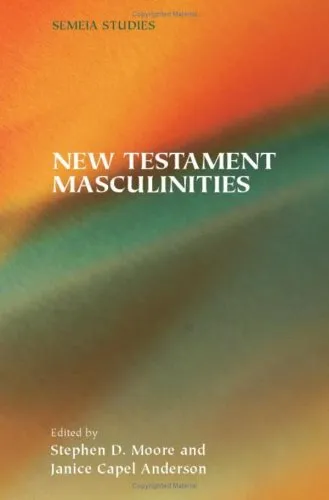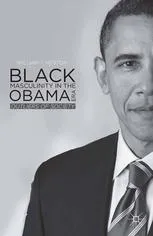New Testament Masculinities (Society of Biblical Literature Semeia Studies)
3.8
بر اساس نظر کاربران

شما میتونید سوالاتتون در باره کتاب رو از هوش مصنوعیش بعد از ورود بپرسید
هر دانلود یا پرسش از هوش مصنوعی 2 امتیاز لازم دارد، برای بدست آوردن امتیاز رایگان، به صفحه ی راهنمای امتیازات سر بزنید و یک سری کار ارزشمند انجام بدینکتاب های مرتبط:
معرفی کتاب "New Testament Masculinities (Society of Biblical Literature Semeia Studies)"
بررسی مردانگی در عهد جدید از دریچهای نوین و بینارشتهای
خلاصهای جامع از کتاب
کتاب New Testament Masculinities اثری پژوهشی است که با استفاده از رویکردهای مطالعات مردانگی و نقد جنسیت به بررسی متون عهد جدید میپردازد. این کتاب مجموعهای از مقالات است که توسط نویسندگان و محققان برجسته تهیه شده و به ایدههای مردانگی در متون کتاب مقدس میپردازد. اثر فوق بهطور خاص تلاش میکند تا مفاهیم متعدد و گاه متناقض مردانگی را در بازه زمانی شکلگیری متون مسیحیت اولیه تحلیل کند.
با تأکید بر تداخل متقابل میان فرهنگ یونانی-رومی و یهودی، این کتاب مرزهای متعارف تفاسیر دینی را کنار میزند و نگاهی تازه به نحوه شکلگیری هویتهای مردانه و نقش آنها در جوامع مختلفِ بازنمایی شده در متون عهد جدید ارائه میدهد. پرسشهای کلیدی مانند "مردانگی در دوران عیسی چطور تعریف میشده؟"، "آیا مردانگی فقط یک گفتمان غالب است یا جریانات دیگری نیز در آن نقش دارند؟" و همچنین "چگونه میتوان نقش جنسیت را در بنیانهای الهیاتی مسیحیت بررسی کرد؟" بهدقت مطرح و واکاوی میشوند.
نکات کلیدی
- تحلیل تاریخی: کتاب به شدت به تحلیلهای تاریخی مبتنیبر متون کهن و نحوه بازتاب مؤلفههای اجتماعی مردانگی در آنها متکی است.
- تلفیق روشهای بینارشتهای: استفاده از روشهایی همچون مطالعات جنسیت، رویکردهای ادبی و تحلیلهای فرهنگی برای بررسی متون.
- تفسیر متون: ارائه خوانشی متفاوت از شخصیتهای مردانه کلیدی در عهد جدید مانند عیسی مسیح، پولس و دیگران.
- چالش گفتمانهای مردسالارانه: این اثر گفتمانهای متعارف مردسالارانه را زیر سؤال برده و نشاندهنده پیچیدگی مردانگی در دوره مسیحیت اولیه است.
جملات معروف از کتاب
“Masculinity in the ancient world was never a singular ideal, but a complex intersection of power, vulnerability, and performance.”
“The New Testament reconfigures traditional gender roles by positioning humility and sacrifice at the center of its vision for male heroism.”
چرا این کتاب اهمیت دارد؟
اثر New Testament Masculinities نه تنها برای محققان دینی و پژوهشگران حقیقتجویی که در پی فهم عمقیتر از عهد جدید هستند اهمیت دارد، بلکه همچنین برای کسانی که به مطالعات جنسیت علاقهمندند، جالب است. این کتاب بهطور خاص نشان میدهد چگونه مفاهیم مردانگی میتوانند تفاسیر جدیدی از دین، فرهنگ و تاریخ ارائه دهند. همچنین، با رویکرد بینارشتهای خود، پلی میان مطالعات دینی و علوم اجتماعی برقرار میکند.
این اثر بهطور جدی چالشهای روششناسی در تحلیل متون مقدس را مطرح کرده و نقش هویتهای جنسیتی در شکلدادن به بنیادهای الهیات مسیحی را روشن میسازد. در نهایت، اهمیت اثر در توانایی آن در تغییر چشمانداز خواننده نسبت به مکانیسمهایی است که جنسیت، قدرت و دین را به هم پیوند دادهاند.
این اثر ضروری برای هر کسی است که خواهان درک پیچیدگیهای جنسیت و مردانگی در متون عهد جدید است.
Introduction to New Testament Masculinities
New Testament Masculinities, edited by Stephen D. Moore and Janice Capel Anderson, is a groundbreaking scholarly work that examines the interplay between masculinity and the New Testament texts. This book, part of the Society of Biblical Literature Semeia Studies series, explores the cultural and sociological constructions of masculinity in the Greco-Roman world and their implications for early Christian writings. By drawing on contemporary gender theory, masculinity studies, and historical-critical methodologies, it provides a fresh perspective on how masculinity is both constructed and contested in the New Testament.
The contributors to this volume delve into various aspects of masculinity, exploring not only how the New Testament texts depict men and male behavior but also how these texts challenge or reinforce the dominant gender norms of antiquity. From Jesus’ redefinition of masculinity to Paul’s rhetorical strategies in crafting male identities, this collection of essays addresses nuanced questions of gender, power, and cultural ideology. The authors thoughtfully engage with the ways masculinity intersects with other social categories such as honor, shame, class, and race, making this an essential read for students, scholars, and anyone interested in the intersection of gender and early Christian studies.
Detailed Summary of the Book
New Testament Masculinities offers an in-depth analysis of how masculinity is articulated, negotiated, and reimagined in the New Testament. The book opens with an exploration of Greco-Roman cultural norms regarding masculinity, focusing on the dichotomy between ideals of manliness—such as control, honor, and authority—and behaviors deemed shameful or feminine. With this historical backdrop, the New Testament writings are positioned as both products of and responses to these hegemonic constructions of gender.
Each chapter spotlights specific texts or themes central to the discussion of masculinity. Topics include the portrayal of Jesus as a subversive model of masculinity that challenges traditional power structures, the role of male discipleship and vulnerability, and Paul’s complex negotiation of male identity in light of his mission to the Gentiles. Additionally, the book examines non-canonical texts and their perceptions of masculinity, bridging the New Testament with broader early Christian traditions.
One of the key strengths of the book is its interdisciplinary approach. By integrating perspectives from feminist studies, queer theory, and masculinity studies, the essays reveal the entwined nature of gender and power in early Christian ethics and theology. The volume serves not only as a critical interrogation of ancient texts but also as a conversation with contemporary debates about what it means to “be a man.”
Key Takeaways
- Masculinity in the New Testament cannot be understood apart from its Greco-Roman cultural context, which defined masculinity in terms of honor, dominance, and control.
- The New Testament offers alternative, often subversive, models of masculinity, especially in the portrayals of Jesus and Paul.
- Gender and power are deeply intertwined in early Christian texts, reflecting both cultural challenges and theological innovations.
- Masculinity in these texts is not monolithic; it is negotiated and expressed in diverse ways, opening space for rethinking traditional gender assumptions.
Famous Quotes from the Book
"The New Testament texts do not simply reflect masculinity; they actively construct and contest it."
"Jesus redefines what it means to 'be a man'—not through dominance but through service, humility, and self-sacrifice."
"Paul’s letters reveal a complex negotiation of masculinity, where strength is found in weakness and leadership is tied to vulnerability."
Why This Book Matters
New Testament Masculinities is a crucial contribution to both biblical studies and gender studies. At a time when discussions around masculinity and gender roles are increasingly prominent in our cultural discourse, this book offers an invaluable historical perspective, demonstrating that these debates are not new but have been part of Christian thought and practice since its inception. By uncovering the implicit and explicit constructions of masculinity in the New Testament, the authors invite readers to critically examine their own assumptions about gender and power.
Furthermore, this book matters because it bridges ancient and modern concerns. For religious communities, it offers a way to engage ethically with gender norms and hierarchies in light of scriptural texts. For academics, it provides a model of interdisciplinary scholarship that links the ancient world with contemporary gender theories. Ultimately, New Testament Masculinities enriches our understanding of both the New Testament and the ongoing human quest to define what it means to live as gendered beings.
دانلود رایگان مستقیم
You Can Download this book after Login
دسترسی به کتابها از طریق پلتفرمهای قانونی و کتابخانههای عمومی نه تنها از حقوق نویسندگان و ناشران حمایت میکند، بلکه به پایداری فرهنگ کتابخوانی نیز کمک میرساند. پیش از دانلود، لحظهای به بررسی این گزینهها فکر کنید.
این کتاب رو در پلتفرم های دیگه ببینید
WorldCat به شما کمک میکنه تا کتاب ها رو در کتابخانه های سراسر دنیا پیدا کنید
امتیازها، نظرات تخصصی و صحبت ها درباره کتاب را در Goodreads ببینید
کتابهای کمیاب یا دست دوم را در AbeBooks پیدا کنید و بخرید



